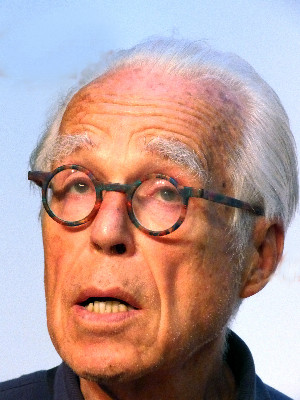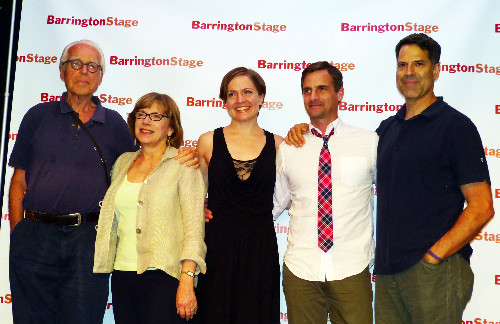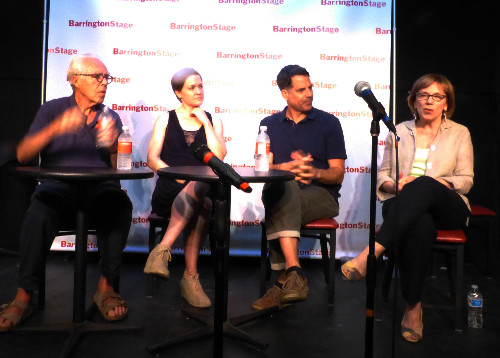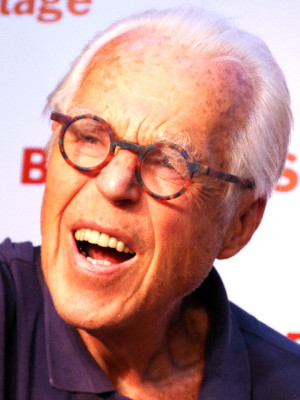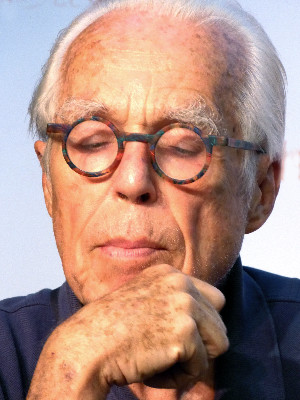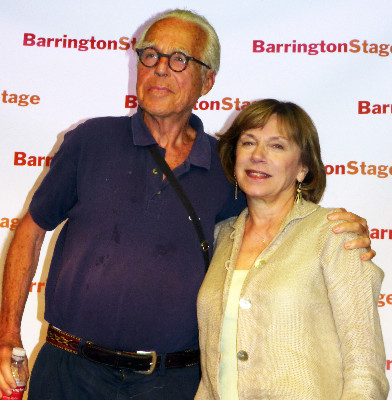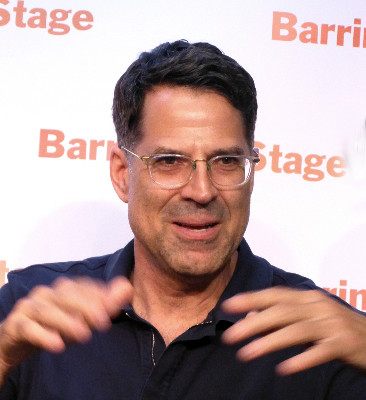Playwright John Guare at Barrington Stage
Updating His Adaptation of His Girl Friday
By: Charles Giuliano - Aug 01, 2015
Barrington Stage Company is presenting “His Girl Friday’’ directed by Julianne Boyd. John Guare adapted it from both the 1940 film of the same name - directed by Howard Hawks and starring Cary Grant and Rosalind Russell - and the 1928 Broadway play on which that was based: Ben Hecht and Charles MacArthur’s “The Front Page.’’
The adaptation premiered at London’s National Theatre in 2003. The play is set in a Chicago courthouse press room on Aug. 31, 1939. It is the night before a Jewish immigrant named Earl Holub is to be executed for shooting a police officer.
As he told The Boston Globe “Nick Hytner was taking over the National Theatre, and his first production was going to be Henry V as if CNN were covering it - so it was going to be the reality of war versus the way we sell the war. He wanted to have a comedy about the media and the press to play in rep with Henry V and he had this idea to take The Front Page and the screenplay of His Girl Friday and make them into one. I said, ‘Yes!’ without even thinking. But getting the rights was so difficult that . . . I had 90 days to write it. So I wrote it, and it went very well. Jack O’Brien directed it. It was heavenly. But I was very dissatisfied; I hadn’t had enough time to live with the work yet, ’cause I’d just been figuring out the dynamics of the piece. I’d never done anything like this. It was just like using all new muscles.”
There have been productions of the play since then and Guare has continued to tweak and refine the script.
Recently Barrington Stage Company held an old fashioned press conference. With a running time of 34 minutes the distinguished playwright, Barrington’s artistic director, Julianne Boyd, as well as the actors Christopher Innvar and Jane Pfitsch fielded a wide range of questions and posed for pictures.
It was just the third day of rehearsals for the Guare adaptation of His Girl Friday. It was the first time that he has worked with Barrington Stage Company.
There was none of the usual boiler plate. Guare enjoyed sparring with the media often pushing back on questions. That made for a lively and insightful dialogue. It provided a fascinating thumbnail of the character, persona and creative brilliance of one of the great playwrights of his generation.
Guare has written House of Blue Leaves (4 Tonys, Obie, Drama Critics Circle), Six Degrees of Separation (London’s Olivier Award for Best Play, NY Drama Critics Circle Award for Best Play, for which he also wrote the screenplay), Landscape of the Body, A Few Stout Individuals, A Free Man of Color (all published by Grove Press), Lydie Breeze, and Lake Hollywood, among others. He wrote the Oscar-nominated screenplay for Louis Malle’s Atlantic City, won a Tony for his libretto to the musical Two Gentlemen of Verona, and was nominated for multiple Tony’s for his play Four Baboons Adoring the Sun and his libretto to Sweet Smell of Success. His adaptation of His Girl Friday premiered at London’s National Theater and his play Are You There, McPhee? premiered at the McCarter Theatre in 2012. He has won the PEN/Laura Pels Master Dramatist Award, the Gold Medal in Drama from the American Academy of Arts and Letters, and an Obie Award for sustained excellence.
John Guare I’ve done seven plays at Williamstown but this is my first time at Barrington Stage which has a wonderful reputation. Front Page as you all know is the ultimate newspaper story. It’s all male. I combine that with His Girl Friday where Howard Hawks had the brilliant idea of making Philby Johnson a woman. There is a gender change
So I took the plays and created a new entity. There was a difference enough that it was a real challenge to do. Getting rights was a nightmare. We announced rehearsals and 90 days before rehearsals were to begin we finally got the rights from the Ben Hecht estate, the Charles MacArthur estate, and Columbia Pictures (1940).
I wrote the play with the wonderful Jack O’Brien directing. It turned out very, very well with a terrific reception in London. Then it was done at the Guthrie with Courtney Vance and Angela Bassett. It’s hard to do because it has such a big cast. That’s why I’m grateful to Julie for having 28 people on stage. (Actually 15) There may be more people on stage than there are in the theatre. There have been a number of productions of it.
I love Christopher Innvar one of my favorite actors. I didn’t know Jane Pfitsch who is playing Hildy Johnson. I met with Julie and was impressed. I saw On the Town (a Tony nominated Barrington production that transferred to Broadway) twice last year in New York. It was one of my favorite plays of the season. She has cast the play brilliantly so I am very happy to be here.
The Front Page with Hecht and MacArthur could be the great American play. It’s this sacrosanct thing to go in and tamper with the play. It’s about newsrooms in the late teens when Hecht and MacArthur worked there after the war. The play opened in 1924. They were writing about newsrooms five to ten years before.
What fascinated me about reading about His Girl Friday was that it was filmed in August, 1939. It was a time in America when the politics were isolationist. We didn’t want to have anything to do with Europe. The filming ended in August and in the beginning of September Hitler invaded Czechoslovakia, then Poland. After that we could no longer deny that there was a world out there. So there were political underpinnings that were fascinating to enrich the play with.
My adaptation of the play is set in August, 1939. The Depression had been going on for nine years with no end in sight. We didn’t want to be involved with what was going on out there. If you think about it 1939 was one of the greatest years in movies with Gone with the Wind and Wizard of Oz, Ninotchka. America was saying get me out of here and let me live there. Let me live in this world that Hollywood gives me.
They were writing about a cutthroat world of just trying to sell newspapers. The news was local and the big news was happening in the back pages. It’s about moving from the local into the international. In New York and Chicago at the time there were giant Bund rallies in support of Hitler. 50,000 people were meeting in Madison Square Garden. There were marches in support of Germany. They were saying this is what we need here in America.
There are all sorts of forces in the play that move the plot along. The Front Page is very much a play about the teens and this play is 25 years later. People back then hated Roosevelt. They didn’t want social security. They didn’t want socialism. The issues then were so similar to what’s going on right now. The Russian Revolution was only twenty years ago. There was still the threat of anarchists and terrorism. The Bolsheviks were still a great, great threat. What’s happening today in government is a funhouse mirror reflection of what was happening 76 years ago. The split in government today is what we are relating to.
Charles Giuliano I broke into newspapers in the 1960s at the daily Boston Herald Traveler. It has gone through many changes and reductions from a broad sheet to now a tight and trimmed tabloid.
The play running up the street Bells are Ringing is about people actually dialing on land lines and having answering machines to intercept their calls.
It is interesting to consider this play representing an era of the primacy of print media. Newspapers really did count.
How are young audiences going to respond to this? For Bells a Ringing we are speculating that twenty-somethings are probably texting during the performance. How are kids going to look at this?
John Guare They have to catch up. It’s as simple as that. You just can’t take out all the land lines. You can’t have the actors goggling each other.
In 1990 I wrote Six Degrees of Separation. That was before Google and it’s all about trying to find out the identity of somebody. If I wrote the play today they would find out that the guy was a fraud in five seconds. There goes my play. Are you suggesting we change the play?
CG No. I’m asking you to comment on an era when print was more important and influential than it is today.
JG If you consider Chekhov and Shakespeare and the Oresteia yes there is a lot different about how we get our information in the last ten years. Just today Julie was saying the new IPhone 6 is so much better than IPhone 5 so already I am feeling out of date. We go to theatre to live in other times.
CG During the 1950s when I was first getting into reading newspapers I recall that there were four or five editions during the day
JG They asked Andy Warhol how he spent his day. He said “I like to spend the day watching the imperceptible difference in each edition of the New York Post.” This was up to 25 to 30 years ago.
For young people it is good to learn there was a time when your life was not just right there in front of you. It’s about life then. But theatre is all about anthropology.
As they say in Bells are Ringing if Romeo and Juliet only had an answering service those two kids would be alive today.
Question Will the actors talk as fast as they did in the film?
JG They will talk fast. As the movie went on the director Howard Hawks sped up the camera. They were not actually talking that fast.
It’s an adaptation and I hope that I’ve honored Hecht and MacArthur. The in joke is that the screenwriter gets no credit. It just had to be a Columbia Pictures film. The screenwriter was Charles Lederer. He was the nephew of Marion Davies who was the mistress of William Randolph Hearst. I like that inside joke that he’s writing about the man who his aunt was the mistress of.
I’ve honored their work. It’s all I can do. In London a reviewer said “It’s wonderful to hear all these classic lines again.” But all the lines they quoted were mine. I have never been asked to do something like this before. Jamie MacArthur the son (adopted) of the playwright and Helen Hayes saw it in London and said to me “You’re right you can do whatever you want. You’re in the spirit of it.” I just want to convey their spirit that’s all I want to do with it.
Astrid Hiemer When you wrote the adaptation what was happening politically on the world stage?
JG We were still living under the nightmare of 9/11. It was 2002 and I was living in 1939 and wanting to escape. I lived downtown in New York. I came back when the first tower had gone down. I turned on the television because I wanted to know what was happening. You wanted news. There was no information. I turned on Turner Classic Movies and watched Fred Astaire and Ginger Rogers in Top Hat. I got hooked in that movie and watched it with such urgency. During the literal horror of what was happening I watched Top Hat.
It reminded me that’s what 1939 is about. The world was falling apart. That’s why I loved writing because it was an escape from the incomprehensibility and from what was happening in the world.
Larry Murray Can you talk about the wit and comedy. Serious messages go down easier with a spoonful of funny business.
JG What’s the serious message? It’s not a message play in any way.
LM It’s set in a serious time.
JG Everything is. No play is set in what is not a serious time. The Importance of Being Ernest is set in a serious time. No play is divorced from its time. So there’s no serious message. I don’t like message plays. If it’s serious enough to write a play about it has to have some weight to it to hold our interest. But I don’t think this is a play where you are embarrassed by the seriousness of your message and are just slathering on. It’s an entertainment. It’s about a look at life. The characters are in the news room a submarine. They’re trapped there. But it’s not a serious message where we have to put a lot of comedy on it. I don’t see the play that way.
LM Being set on the edge of WWII with the nation at an impasse that comedy was used as a way to escape those worries.
JG No matter where you are there are funny things happening. There are horrible times in the ghastly 20th century. Even now at Guantanamo Bay. But I’m sure that even there somebody has slipped on a banana peal. Life is happening. It’s about life. It doesn’t stop going on because you’re in a horrible situation.
Question Was the language different then from what it is today. Social media, Facebook and texting have changed the way we communicate. Is there a difference in the use of language in the play?
JG Back then we wanted Walter Winchell for our gossip. We wanted H.V. Kaltenborn or Lowell Thomas for the seriousness of our news. Alexander Humphreys Woollcott was one of the most famous men in the world. He would be completely forgotten were it not for The Man Who Came to Dinner. He was a great wit who went after everything.
(One of New York's most prolific drama critics, Woolcott was banned for a time from reviewing certain Broadway shows due to his florid and often vitriolic prose He sued the Shubert theater organization for violation of the New York Civil Rights Act, but lost in the state's highest court in 1916 on the grounds that only discrimination on the basis of race, creed or color was unlawful. From 1929 to 1934, he wrote a column called "Shouts and Murmurs" for The New Yorker.)
Pundits back then with formidable they quoted Herodotus and Thucydides as their models. Back then was a much more intellectual time. There was admiration for intellectual thinking. In our elitist world today any show of intellect is regarded as showing off and suspect. There was a pride back then in a grandeur of tone. People studied rhetoric. More so than we do today.
Hemingway was a newspaper man. It’s why he was such a great war reporter. Just tell the facts as they are. That’s always what the news does best. As the New York Times says “All the News That’s Fit to Print.”
I don’t think you have to struggle to get the outside world into the play. It centers around an anarchist who has shot a cop. In the original it was a young American who shot a black cop. This time the anarchist is an immigrant. The shooter is from Germany by way of Czechoslovakia. He came to America to flee the Nazis. He gets tied up with a pro Nazi policeman. So you don’t have to search out for the politics they are built right into the story.

